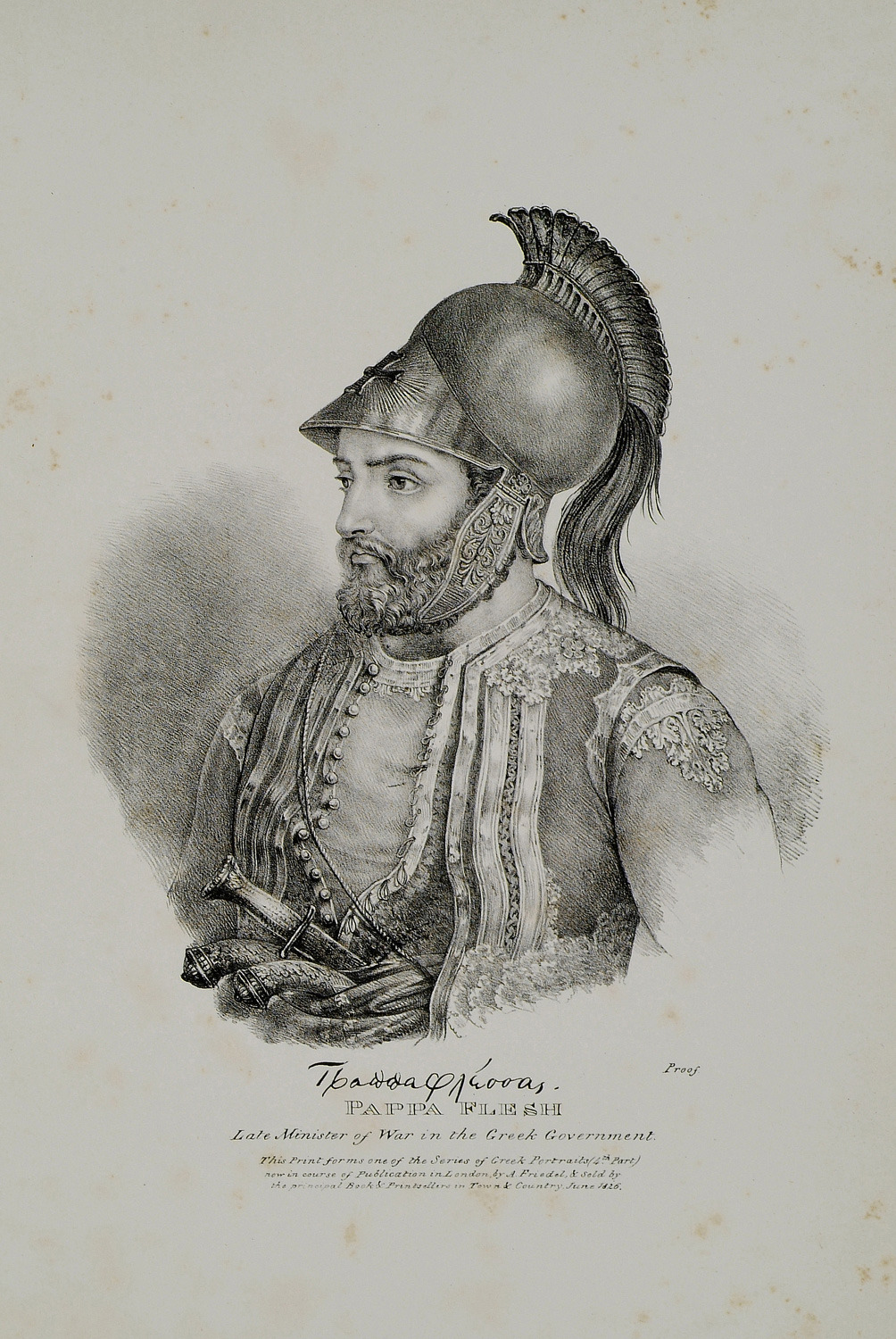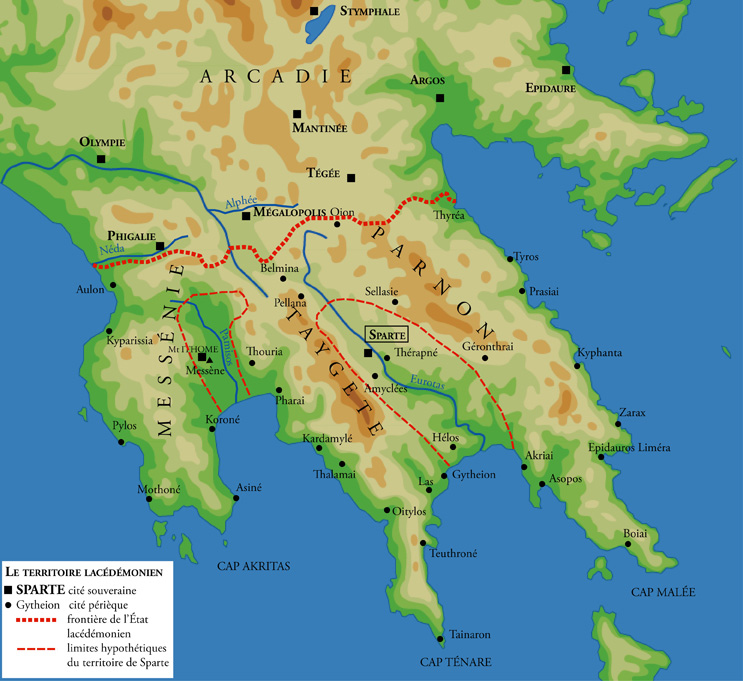|
Papaflessas
Grigorios Dimitrios Dikaios-Flessas (; 1788 – 25 May 1825), popularly known as Papaflessas () was a Greek priest and government official who became one of the most influential figures during the Greek War of Independence. The prefix () in the name ''Papaflessas'' indicates his status as a cleric since the word means 'priest' in Greek. He was appointed Archimandrite in 1819. He served as Minister of Internal Affairs and Chief of Police in the government of Alexander Mavrokordatos. Papaflessas was killed during the Battle of Maniaki on May 20, 1825, fighting against the forces of Ibrahim Pasha at Maniaki, Messinia. Name Georgios Dimitrios Dikaios-Flessas was his birth name. His monastic name was Grigorios Flessas (, Grigórios Flessas) or Papaflessas, while the pseudonym he used later in his life was Grigorios Papaflessas (). Early life Grigorios Papaflessas was born Georgios Flessas or Flesias () in 1788 in the village of Poliani in Messinia. His father was Demetrios G. Fle ... [...More Info...] [...Related Items...] OR: [Wikipedia] [Google] [Baidu] |
Battle Of Maniaki
The Battle of Maniaki was fought on May 20, 1825 in Maniaki, Greece (in the hills east of Gargalianoi) between Ottoman Egyptian forces led by Ibrahim Pasha and Greek forces led by Papaflessas.Finlay, p. 75. "He quitted Nauplia with great parade, attended by a body of veteran soldiers; and when he reached the village of Maniaki, in the hills to the east of Gargaliano, his force exceeded three thousand men. The bold priest possessed no military quality but courage. He posted his troops in an ill-selected position and awaited the attack of Ibrahim, who advances in person to carry the position at the head of six thousand men on 1 June. Many of the archimandrite's troops, seeing the superior force of the Egyptians, deserted during the night, and only about fifteen hundred men remained. The pasha's regulars were led on to storm the Greek intrenchments in gallant style, and a short and desperate struggle ensued. The Greeks were forced from their position before they fled. The affair was ... [...More Info...] [...Related Items...] OR: [Wikipedia] [Google] [Baidu] |
Greek War Of Independence
The Greek War of Independence, also known as the Greek Revolution or the Greek Revolution of 1821, was a successful war of independence by Greek revolutionaries against the Ottoman Empire between 1821 and 1829. The Greeks were later assisted by the British Empire, Bourbon Restoration in France, Kingdom of France, and the Russian Empire, while the Ottomans were aided by their North African vassals, particularly the eyalet of Egypt Eyalet, Egypt. The war led to the formation of modern Greece. The revolution is Celebration of the Greek Revolution, celebrated by Greeks around the world as Greek Independence Day, independence day on 25 March. Greece, with the exception of the Ionian Islands, came under Ottoman rule in the 15th century, in the decades before and after the fall of Constantinople. During the following centuries, there were sporadic but unsuccessful Ottoman Greece#Uprisings before 1821, Greek uprisings against Ottoman rule. In 1814, a secret organization called Filiki Et ... [...More Info...] [...Related Items...] OR: [Wikipedia] [Google] [Baidu] |
Filiki Etaireia
Filiki Eteria or Society of Friends ( el, Φιλικὴ Ἑταιρεία ''or'' ) was a secret organization founded in 1814 in Odessa, whose purpose was to overthrow the Ottoman rule of Greece and establish an independent Greek state. (''retrieved from University of California Library'') Society members were mainly young Phanariot Greeks from Constantinople and the Russian Empire, local political and military leaders from the Greek mainland and islands, as well as several Orthodox Christian leaders from other nations that were under Hellenic influence, such as Karađorđe from Serbia, Tudor Vladimirescu from Romania, and Arvanite military commanders. One of its leaders was the prominent Phanariote Prince Alexander Ypsilantis. ''retrieved 9 May. 200Encyclopedia.com' The Society initiated the Greek War of Independence in the spring of 1821. Translations and transliterations The direct translation of the word "Φιλική" is "Friendly" and the direct translation of "Ἑταιρ ... [...More Info...] [...Related Items...] OR: [Wikipedia] [Google] [Baidu] |
Battle Of Dervenakia
The Battle of Dervenakia ( el, Μάχη των Δερβενακίων) was the Greek victory over the Ottoman forces on 6- 8 August 1822, an important event in the Greek War of Independence. It resulted in the defeat of a major expedition by Mahmud Dramali Pasha, intended to quell the ongoing Greek rebellion which had begun in 1821. The destruction of Dramali Pasha's forces saved the heartland of the rebellion, the Morea, and secured it for the Greeks until the arrival of Ibrahim Pasha in 1825. Background After the Greek victory at the Battle of Vasilika in 1821, the Ottoman army was prevented from entering Attica and the Peloponnese, and by the summer of 1822 the Ottomans were prepared for another attempt to move southwards and crush the Greek uprising. The Ottomans had assembled an army of some 20,000 men and 8,000 cavalry with ample supplies and transportation at Larissa, which was eventually entrusted to Dramali Pasha of Drama, the army was the largest seen in Greece since ... [...More Info...] [...Related Items...] OR: [Wikipedia] [Google] [Baidu] |
Messinia
Messenia or Messinia ( ; el, Μεσσηνία ) is a regional unit (''perifereiaki enotita'') in the southwestern part of the Peloponnese region, in Greece. Until the implementation of the Kallikratis plan on 1 January 2011, Messenia was a prefecture (''nomos'') covering the same territory. The capital and largest city of Messenia is Kalamata. Geography Physical Messenia borders on Elis to the north, Arcadia to the northeast, and Laconia to the southeast. The Ionian Sea lies to the west, and the Gulf of Messinia to the south. The most important mountain ranges are the Taygetus in the east, the Kyparissia mountains in the northwest and the Lykodimo in the southwest. The main rivers are the Neda in the north and the Pamisos in central Messenia. Off the south coast of the southwesternmost point of Messenia lie the Messinian Oinousses islands. The largest of these are Sapientza, Schiza and Venetiko. The small island Sphacteria closes off the bay of Pylos. All these is ... [...More Info...] [...Related Items...] OR: [Wikipedia] [Google] [Baidu] |
Kalamata
Kalamáta ( el, Καλαμάτα ) is the second most populous city of the Peloponnese peninsula, after Patras, in southern Greece and the largest city of the homonymous administrative region. As the capital and chief port of the Messenia regional unit, it lies along the Nedon River at the head of the Messenian Gulf. The 2011 census recorded 69,849 inhabitants for the wider Kalamata Municipality, of which, 62,409 resided in the municipal unit of Kalamata, and 54,567 in the city proper. Kalamata is renowned as the land of the Kalamatianos dance and Kalamata olives. Name The modern name ''Kalamáta'' is a corruption of the older name Καλάμαι, ''Kalámai'', " reeds". The phonetic similarity of ''Kalamáta'' with the phrase καλά μάτια "kalá mátia" ("good eyes") has led to various folk etymologies. Administration The municipality Kalamata was formed as part of the 2011 local government reform by the merger of the following four former municipalities, each of w ... [...More Info...] [...Related Items...] OR: [Wikipedia] [Google] [Baidu] |
Ottoman Turks
The Ottoman Turks ( tr, Osmanlı Türkleri), were the Turkic founding and sociopolitically the most dominant ethnic group of the Ottoman Empire ( 1299/1302–1922). Reliable information about the early history of Ottoman Turks remains scarce, but they take their Turkish name, ''Osmanlı'' ("Osman" became altered in some European languages as "Ottoman"), from the house of Osman I (reigned 1299–1326), the founder of the House of Osman, the ruling dynasty of the Ottoman Empire for its entire 624 years. Expanding from its base in Söğüt, the Ottoman principality began incorporating other Turkish-speaking Muslims and non-Turkish Christians. Crossing into Europe from the 1350s, coming to dominate the Mediterranean Sea and, in 1453, invading Constantinople (the capital city of the Byzantine Empire), the Ottoman Turks blocked all major land routes between Asia and Europe. Western Europeans had to find other ways to trade with the East. Brief history The "Ottomans" first ... [...More Info...] [...Related Items...] OR: [Wikipedia] [Google] [Baidu] |
Thouria, Messenia
Thouria ( el, Θουρία) is a village and a former municipality in Messenia, Peloponnese, Greece. Since the 2011 local government reform it is part of the municipality Kalamata Kalamáta ( el, Καλαμάτα ) is the second most populous city of the Peloponnese peninsula, after Patras, in southern Greece and the largest city of the homonymous administrative region. As the capital and chief port of the Messenia reg ..., of which it is a municipal unit. The municipal unit has an area of 76.922 km2. Its population in 2011 was 2,721. It takes its name from the ancient town of Thuria. References Populated places in Messenia {{Peloponnese-geo-stub ... [...More Info...] [...Related Items...] OR: [Wikipedia] [Google] [Baidu] |
Klepht
Klephts (; Greek κλέφτης, ''kléftis'', pl. κλέφτες, ''kléftes'', which means "thieves" and perhaps originally meant just "brigand": "Other Greeks, taking to the mountains, became unofficial, self-appointed armatoles and were known as klephts (from the Greek ''kleptes'', "brigand").") were highwaymen turned self-appointed armatoloi, anti-Ottoman insurgents, and warlike mountain-folk who lived in the countryside when Greece was a part of the Ottoman Empire. They were the descendants of Greeks who retreated into the mountains during the 15th century in order to avoid Ottoman rule.: "The klephts were descendants of Greeks who fled into the mountains to avoid the Turks in the fifteenth century and who remained active as brigands into the nineteenth century." They carried on a continuous war against Ottoman rule and remained active as brigands until the 19th century. The terms kleptomania and kleptocracy are derived from the same Greek root, κλέπτειν (''klépte ... [...More Info...] [...Related Items...] OR: [Wikipedia] [Google] [Baidu] |
Leontari, Arcadia
Leontari ( el, Λεοντάρι, meaning ''Lion'' in English) is a village and a community in the southwestern part of Arcadia, Greece, seat of the former municipality of Falaisia. It is situated on a hillside, 6 km east of Paradeisia, 9 km northwest of Kamara and 9 km south of Megalopoli. The community consists of the villages Leontari (population 257 in 2011), Gavria (pop. 9), Kalyvia (pop. 11), Kamaritsa (pop. 22) and Kotsiridi (pop. 22). Leontari has several monuments from the Byzantine era, including the richly decorated 14th century Church of the Holy Apostles. The area suffered damage from the 2007 Greek forest fires. It is considered a traditional settlement. Persons *Nikitaras, Greek revolutionary See also *List of settlements in Arcadia *List of traditional settlements of Greece Traditional settlements in Greece are considered those settlements that have retained their unchanged image of the past, as well as their local character. The traditional set ... [...More Info...] [...Related Items...] OR: [Wikipedia] [Google] [Baidu] |






